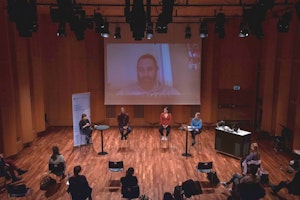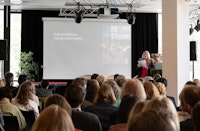Due to the coronavirus pandemic, the Music Student Conference 2020 at the Norwegian Academy of Music (NMH) had to be moved from 1 April to 30 October. The six-month delay did not make the programme less relevant. On the contrary.
What are the employment prospects of newly graduated music students in a society turned on its head because of Covid-19? Is the future bleak, or has the crisis served as a catalyst for necessary innovation?
These questions were on the agenda for the panel discussion that concluded the conference. Ida Habbestad from the Norwegian Society of Composers chaired the panel, which comprised the artistic director of the Ultima festival Thorbjørn Tønder Hansen, musician Kristoffer Lo, the director of Norsk Jazzforum Gry Bråtømyr, and Siri Storheim, NMH student and co-organiser of the Music Student Conference.
Professor of cultural sociology Sigrid Røyseng had also been due to attend, but was prevented from appearing due to illness.




